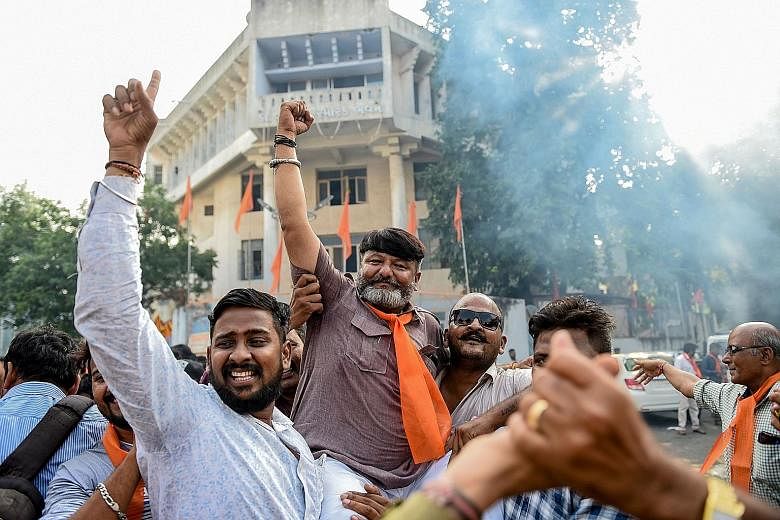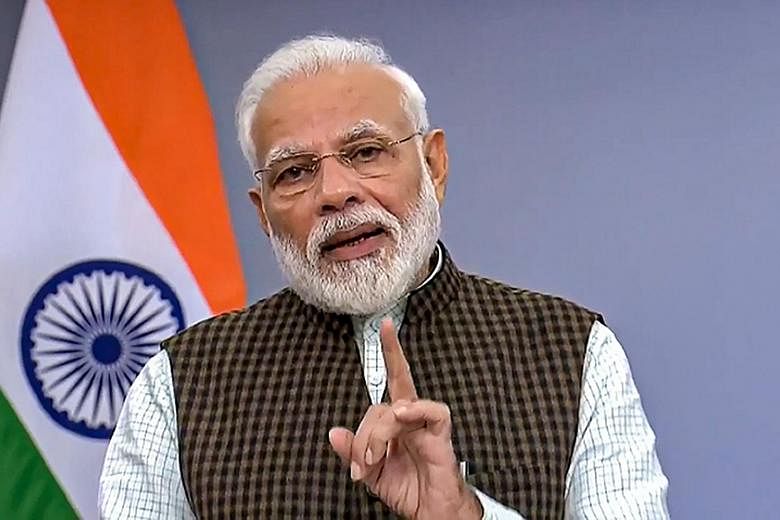AYODHYA/MUMBAI • Just six months after sweeping to re-election, Indian Prime Minister Narendra Modi has delivered on two major promises of his Hindu-first agenda, electrifying his base but sowing unease among liberals and the nation's Muslim minority.
The latest boost for Mr Modi came last Saturday, when the Supreme Court handed Hindu groups control of a contested site where a 16th-century mosque was razed over two decades ago, paving the way for the construction of a temple that has long been an election promise of the ruling Bharatiya Janata Party (BJP).
That followed New Delhi's move in August to strip Muslim-majority Jammu and Kashmir of its special status as a state in what Mr Modi's government said was a bid to integrate the restive region with the rest of predominantly-Hindu India.
Now, the BJP may move towards delivering on its third traditional plank: creating a uniform civil code that does away with the independence of religious communities.
"After just a few months of Modi 2.0, they've accomplished two out of three (main cultural objectives). It's quite possible that they will accomplish all three by next year," said Dr Milan Vaishnav, a senior fellow at the Carnegie Endowment for International Peace in Washington.
"It's striking that the government has moved with a clarity of purpose on its social agenda that's completely absent when it comes to economic matters," added Dr Vaishnav, in reference to the slowing of the country's once red-hot economic growth.
The controversial site in the northern state of Uttar Pradesh has been one of the most explosive issues in the nation of 1.3 billion, where Muslims constitute about 14 per cent of the population.
In 1992, a rally led by the BJP and affiliate organisations spiralled out of control and a Hindu mob destroyed the Babri Masjid, or mosque, in the city of Ayodhya. That triggered riots in which about 2,000 people, most of them Muslims, were killed across the country.
In its verdict last Saturday, the Supreme Court called the mosque's demolition illegal but handed the plot of land to Hindus, who believe the site is the birthplace of Lord Ram, a much venerated God-king. The court directed that another plot in Ayodhya be given to a Muslim group that contested the case.
In over a dozen interviews, Muslim community leaders, businessmen and students said they respected the verdict but it exacerbated their sense of alienation.
"Why did the court then give a ruling which is completely one-sided? Was the court under pressure? We don't know. We can't trust anyone now. No door is open for us," said local Muslim community leader Azam Quadri during evening prayers in Ayodhya.
While Mr Modi himself has said the court verdict should not be seen as a "win or loss" for anyone, many Muslims expressed resignation after the ruling. Some were bitter that a probe into the demolition has inconclusively dragged on for three decades and that many of the politicians accused of conspiring to take down the mosque are prominent BJP members.
"I feel humiliated by the Supreme Court verdict," said one affluent Mumbai-based Muslim businessman, who declined to give his name. "Others don't care. They have become numb. It's best to be numb in Modi's India."
Some people believe that Hindu nationalists, galvanised by the Ayodhya triumph, could turn their attention to two other Uttar Pradesh mosques they believe Mughal conquerors built over the remains of Hindu temples centuries ago.
Another likely move is the uniform civil code. New Delhi has already taken steps towards creating such a code, with the BJP-led Parliament in July outlawing the centuries-old right of a Muslim man to instantly divorce his wife.
Despite the focus on social issues, political analysts predict the government and the BJP will have to shift attention quickly to a sagging economy and surging unemployment or risk losing popular support.
REUTERS


